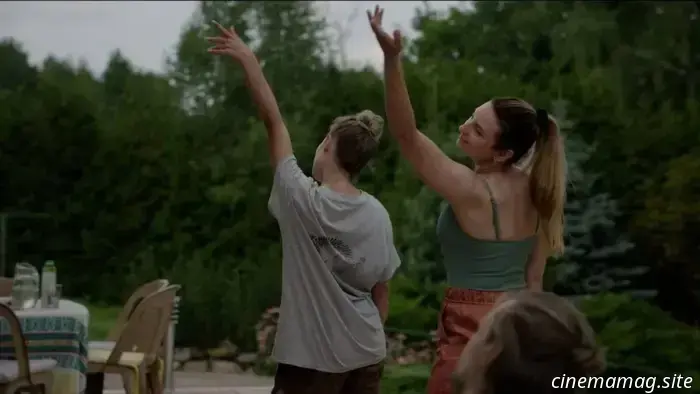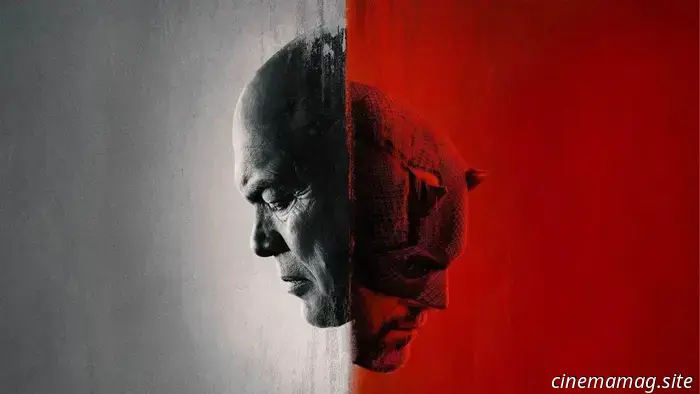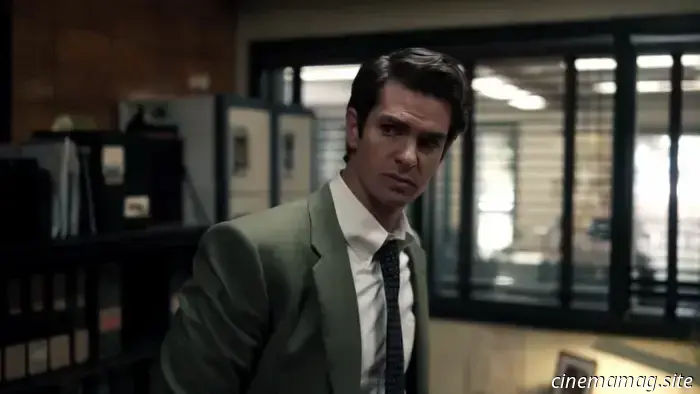
Drowning Dry Review: A Disturbing and Darkly Humorous Lithuanian Drama
Note: This review was initially published as part of our 2024 coverage of Locarno Film Festival. Drowning Dry will be released in theaters on July 18.
Memories can be elusive. Consider what transpires in the middle of Laurynas Bareiša’s captivating second feature: two women—specifically Ernesta (Gelminė Glemžaitė) and Juste (Agnė Kaktaitė), sisters enjoying a holiday with their respective families (each with a husband and one child, a son and a daughter)—begin to dance to a song by Donna Lewis, their routine seemingly a blend of half-forgotten moves and instinctive muscle memory. This mesmerizing moment is abruptly interrupted by their children’s request to go swimming, leading to one child seemingly drowning. Following this, the film fast-forwards, revealing Ernesta visiting a man whose life was saved by one of her deceased husband’s organs. Before the cause of the husband’s death is revealed, the narrative shifts back: the same holiday, the same sisters, the same dance, but now accompanied by Lighthouse Family. “When you’re close to tears, remember,” sings Tunde Baiyewu, “someday it’ll all be over.”
The film’s title, Drowning Dry, refers to a medical term denoting the unfortunate occurrence of surviving an initial drowning only for the vocal cords to spasm, preventing airflow to the lungs. During a discussion in Locarno, where the film had its premiere, Bareiša noted that the “irregular repetition” typified by this condition inspired the film’s fragmented narrative structure. He also confirmed, in a more straightforward manner, that Drowning Dry, similar to his prior film Pilgrims (which won the Orrizonti award in Venice in 2021), explores themes of trauma. While this term is frequently used in festival descriptions today, Bareiša’s film stands out as a unique piece: conceptually profound in its design and themes, visually stunning in a deliberately elusive manner, and even darkly humorous at times.
That day in Locarno started with a screening of Kurdwin Ayub’s Mond, a film about an Austrian MMA fighter hired to train the daughters of a wealthy Jordanian family. Drowning Dry followed immediately after, making its nearly identical opening scene—featuring another battered fighter at the end of a match in a UFC-style Octagon—almost jarring. This time, the fighter is Ernesta’s husband, Lukas (Paulius Markevičius), who wins his tournament but finds himself backstage afterward with a distraught Ernesta. Bareiša introduces several concerning signs in the initial sequences. The most direct of these occurs as the families head to the sisters’ inherited vacation home, where Juste’s husband, Tomas (Giedrius Kiela), performs a reckless maneuver on the road that Lukas tries to imitate. This performative male bravado evokes the kind of satire often employed by Ruben Östlund as a catalyst for his narratives. However, Bareiša uses it as a breadcrumb trail leading to tragedy.
This sequence represents the most intense moment in a film characterized by more subtly disquieting visuals—captured by the director himself. The actors' faces are seldom shown prominently, especially in close-up. Instead, much like a memory, the characters are seen from a medium distance, moving through dimly lit spaces with their faces either turned away from the camera or cast in shadow. The cumulative effect resembles someone attempting to piece together a troubling puzzle, yet the film never fully succumbs to despair. Overwhelming emotions are largely countered by sisterly support, philosophical acceptance, or touches of dark humor. Bareiša’s second feature wrestles with profoundly serious themes, but this is a director who understands the importance of knowing when to emerge for air.
Drowning Dry premiered at the Locarno Film Festival.
Other articles
 Apocalypse in the Tropics Review: An Examination of Brazil’s Politically Engaged Religious Right
Note: This review was initially published as part of our coverage of the 2024 NYFF. "Apocalypse in the Tropics" is now playing in theaters and available on Netflix. After five years, during Brazil's most closely contested presidential election and following one insurrection since her last analysis of the country's turbulent socio-political landscape, Petra Costa––the talented filmmaker known for "Elena" and "The Edge of"
Apocalypse in the Tropics Review: An Examination of Brazil’s Politically Engaged Religious Right
Note: This review was initially published as part of our coverage of the 2024 NYFF. "Apocalypse in the Tropics" is now playing in theaters and available on Netflix. After five years, during Brazil's most closely contested presidential election and following one insurrection since her last analysis of the country's turbulent socio-political landscape, Petra Costa––the talented filmmaker known for "Elena" and "The Edge of"
 Daredevil: Born Again season 2 has completed filming and has added another returning actor from the original Netflix series.
The highly awaited second season of Daredevil: Born Again has completed production. However, that's not the only thrilling update, as fans of the original Netflix Daredevil series will be pleased to know that another actor is making a comeback to support Daredevil and his companions in their battle against Kingpin. Naqam Washington shared this news in an Instagram post.
Daredevil: Born Again season 2 has completed filming and has added another returning actor from the original Netflix series.
The highly awaited second season of Daredevil: Born Again has completed production. However, that's not the only thrilling update, as fans of the original Netflix Daredevil series will be pleased to know that another actor is making a comeback to support Daredevil and his companions in their battle against Kingpin. Naqam Washington shared this news in an Instagram post.
 Netflix reveals a live-action series based on Solo Leveling.
Netflix is set to adapt Solo Leveling into a live-action series, confirming that production has begun on this highly popular Korean intellectual property. According to the official press release, actor Byeon Woo-seok (from 20th Century Girl) will star in the role of Sung Jin-woo, an E-rank Hunter, which is the lowest classification. [...]
Netflix reveals a live-action series based on Solo Leveling.
Netflix is set to adapt Solo Leveling into a live-action series, confirming that production has begun on this highly popular Korean intellectual property. According to the official press release, actor Byeon Woo-seok (from 20th Century Girl) will star in the role of Sung Jin-woo, an E-rank Hunter, which is the lowest classification. [...]
 Andrew Garfield is set to star alongside Yura Borisov in Luca Guadagnino's Artificial.
Former Spider-Man Andrew Garfield has been cast in Luca Guadagnino’s upcoming film, Artificial, where he will star alongside Yura Borisov from Anora. The film is characterized as a "comedic drama set in the realm of artificial intelligence." Guadagnino will direct the movie, which is based on a script by Simon Rich (An American Pickle), and production will be handled by Rich along with David from Heyday Films.
Top Welcome Bonus Casino Offers for 2025 — Get Free Cash to Begin Playing - MovieMaker Magazine
As we reach the midpoint of 2025, it's an opportune moment to reassess your online casino choices. In this article, we will assist you in updating your
Andrew Garfield is set to star alongside Yura Borisov in Luca Guadagnino's Artificial.
Former Spider-Man Andrew Garfield has been cast in Luca Guadagnino’s upcoming film, Artificial, where he will star alongside Yura Borisov from Anora. The film is characterized as a "comedic drama set in the realm of artificial intelligence." Guadagnino will direct the movie, which is based on a script by Simon Rich (An American Pickle), and production will be handled by Rich along with David from Heyday Films.
Top Welcome Bonus Casino Offers for 2025 — Get Free Cash to Begin Playing - MovieMaker Magazine
As we reach the midpoint of 2025, it's an opportune moment to reassess your online casino choices. In this article, we will assist you in updating your
.jpg) Watch John Lennon pour his emotions into his performance during his first concert after the Beatles (Exclusive).
The new documentary One to One: John & Yoko explores a fascinating period in the lives of John Lennon and Yoko Ono: He has departed from the Beatles and is preparing a
Watch John Lennon pour his emotions into his performance during his first concert after the Beatles (Exclusive).
The new documentary One to One: John & Yoko explores a fascinating period in the lives of John Lennon and Yoko Ono: He has departed from the Beatles and is preparing a
Drowning Dry Review: A Disturbing and Darkly Humorous Lithuanian Drama
Note: This review was initially shared during our coverage of the 2024 Locarno festival. "Drowning Dry" will be released in theaters on July 18. Memories can be elusive. Consider the events that unfold around the midpoint of Laurynas Bareiša's captivating second feature: two women––specifically Ernesta (Gelminė Glemžaitė) and Juste (Agnė Kaktaitė), sisters vacationing with their individual
